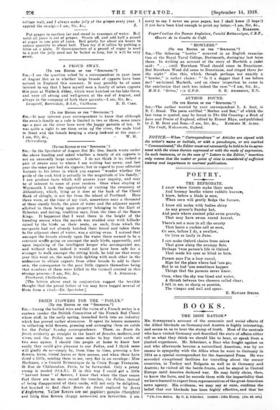[To THE EDITOR OF THE " SPECTATOR.") SIR ,—In the
Spectator of August 31st Mr. Geo. Smith wrote under the above heading and asked whether a family of six cygnets is not an unusually large number. I do not think it is; indeed a pair of swans near to where I am writing has seven, and last year the same pair had six cygnets; but in regard to your editorial footnote to his letter in which you express " wonder whether the pride of the cock bird is actually in the magnitude of his family," I can produce facts which will answer your inquiry, and may be of interest to some of your readers. Once when staying at Weymouth I took the opportunity of visiting the swannery at Abbotabury, which, lying as it does at the back of the Chesil Bank of shingle, is not far from the island of Portland. Here there were, at the time of my visit, somewhere near a thousand of these stately birds, the piece of water and the adjacent marsh allotted to them being upon property belonging to the Earl of Echester, and dating, tradition says, from the time of the Saxon Kings. It happened that I went there in the height of the breeding season when the marsh was studded over with hillocks raised by the birds as their nests, on each, from which the occupants had not already hatched their brood and taken them to the adjacent sheet of water, was a sitting swan. I noticed that amongst the broods already upon the water there seemed to be a constant scuffle going on amongst the male birds, apparently, and upon inquiring of the intelligent keeper who accompanied me, and without whom indeed it would not have been safe for a stranger to walk amongst the sitting birds, he told me that every year this went on, the male birds fighting with each other in the endeavour to obtain cygnets from other broods to add to their own, the consequence to the poor little cygnets themselves being that numbers of them were killed in the turmoil created in this
strange process.—I am, Sir, &c., T. A. Arscorea. Pinch urst, Cheltenham.
[The letters above read in conjunction suggest the terrible thought that the proud father of ten may have bagged several of them from a rival.—En. Spectator.]


























 Previous page
Previous page